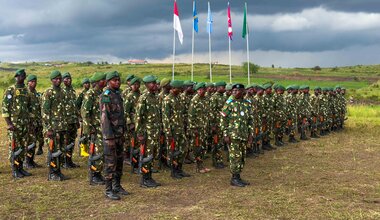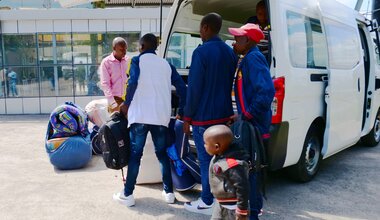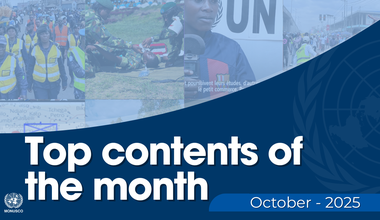Ituri: MONUSCO encourages collaboration between the population and the police to fight insecurity
How can the "crisis of confidence" between the Congolese National Police and the civilian population be ended or at least reduced? This question was the subject of a round table discussion on 20 December 2022 organised by the office of the United Nations Mission in Congo in Bunia. More than sixty participants representing the judiciary, the provincial government, the Congolese national police and various youth movements took part.
"There are several challenges to the role of the police in our province. We had to enumerate the weakness first of all in relation to its regalian mission where the population does not see itself in its role that it is playing; we also denounced the numerous harassments in the city of Bunia but also in the interior of the province; we also identified corruption. This has a negative impact on collaboration with the police and it plays on the crisis of confidence between the police and us civilians," said Gentil Kaniki, president of the Ituri provincial youth council.
The police: a role not always well understood
Some participants admitted that they were not sufficiently informed about the main missions of the police, whose role is often misunderstood by the population. For them, there is a big effort to be made by the authorities to improve the perception of the police by the population. This was an opportunity for the director of the provincial governor's office to recall the main missions of the police: securing property and people; protecting civilians; supporting the judiciary; fighting organised crime and fraud; respecting and maintaining public order.
For the provincial commissioner of the PNC in Ituri, what some describe as a crisis of confidence is nothing more than a misunderstanding. While acknowledging some deviant behaviour among some men in blue uniforms, General Seguin Sengelwakyo invites the population to sort out the wheat from the chaff because, according to him, a few indelicate elements cannot make the entire police force bear all the evils it is accused of: "All you need to know is that today we are experimenting with reform, a reform that is necessary in a democratic state. A partnership must be established between the police and the population, and the population must understand that security issues no longer concern only the police, but also the population insofar as security management is shared between the police and the citizens. It is also true that there may be some black sheep in the police, but this does not give the whole police force a black mark because you will find that this population, the population of Bunia in particular, and the population of Ituri in general, is satisfied with our action...".
What support from MONUSCO?
Since its establishment in the DRC in 1999, MONUSCO has always been at the side of the Congolese National Police to help it reform and professionalize, while respecting human rights. This ongoing support has resulted in capacity building for the PNC, through specific training in all areas of the Congolese police's activities, logistical support (including donations of equipment, vehicles, office furniture, construction of premises, support for complex investigations, etc.), technical support and various awareness-raising activities.
As in some towns in the DRC, MONUSCO helped to set up the SOLIB (Operational Strategy to Combat Insecurity in Bunia) in Bunia. The UN Mission's support here includes the delivery of fuel, food rations, the setting up of two toll-free numbers that the population can call free of charge to report cases of insecurity in the community, and various training courses on specific subjects.
Marc Karna Soro, MONUSCO's head of office in Bunia, acknowledges that, thanks to this support, the PNC has become more professional and better able to respond to the concerns of the population. "As MONUSCO, we accompany the Congolese police. For example, we are currently training police officers at the request of the Democratic Republic of Congo, we work with them on a daily basis. We have our police officers who go around the police stations, who mentor them, who accompany them on a daily basis... The discussions we have had today are to enable the police and the citizens to get to know each other better and to maintain this contact, these exchanges in both directions, because the police also have expectations of the citizens, and it must also be said that these police officers are citizens.
He continued: "In a few days, we are going to launch the construction of infrastructure at the police academy here in Bunia. We are in the process of deploying containers in outlying areas to help the police get closer to the population. We are working with the police on a project to set up an operations coordination centre here in Bunia. This coordination centre will allow us to centralise information, to articulate the response in time and to allow general monitoring of the situation. We have provided the police with equipment to maintain public order. Once again, I insist that it is a population-police tandem that will make it possible to curb insecurity in Ituri.”
The participants recognised the importance of the police for the population. Where the army takes over positions from the enemy in Ituri, it is the police who take over.
On an official visit to Ituri, the commander and head of the MONUSCO police component, General Mody Berethe, also took part in this exchange with the civilian population. During this visit, he also discussed with the provincial commissioner of the PNC/Ituri and the provincial governor of Ituri how to strengthen the MONUSCO-PNC partnership.
General Mody Berethe also presided over the ceremony of awarding UN merit medals to some 150 peacekeepers, including 14 peacekeepers from the Senegalese Formed Police Unit (SNFPU); medals that reward the bravery and commitment of these peacekeepers to peace and the protection of civilians in this province plagued by armed conflict.

 UN
UN United Nations Peacekeeping
United Nations Peacekeeping






